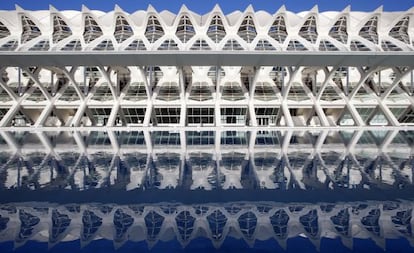Splash out then watch the crash
Slew of reports on the ruinous finances of Valencia region puts officials on the defensive Tarnished reputation causes concern for tourism sector

By the time the German network SAT 1 airs its television report on the Valencian region this week, an international audience of over 150 million spectators will know all about the ballooning costs of Valencia’s cultural complex City of Arts and Sciences. They will also be familiar with the case of Castellón airport, which has never seen a single plane.
A group of journalists calling themselves Xarxa Urbana, creators of the ironically named Ruta del Despilfarro (The Wastefulness Tour), spent eight months helping foreign TV stations like NHK (Japan), Al Jazeera, France 2, DR (Denmark) and the BBC discover the side of a region that “embodies all that’s wrong with Spain,” as Reuters put it last September.
The Valencia brand, once a powerful magnet for investment, is in a nosedive. If a decade ago the Mediterranean region lured foreign money with an image of modernity founded on the designs of star architect Santiago Calatrava and on major sports events including the Americas Cup and Formula 1, Valencia is now being presented abroad as a textbook example of a debt-ridden economy dragged down by real estate madness and squandering of public money. The link between Valencia and its City of Arts and Sciences, mirroring Bilbao and the Guggenheim, has become a burden now that the complex’s financial troubles have come to the fore. Calatrava’s landmark work has been racking up the bad news — from its high construction cost (1.28 billion euros compared with 120 million for the Basque museum) to the architect’s recent decision to take his fortune to Switzerland.
“It’s ridiculous to think that the BBC has damaged Valencia”
The economics editor at the BBC, Paul Mason, was the journalist behind a documentary entitled The Great Spanish Crash, which used the Valencia region as a metaphor for the crisis that has hit the country's entire economy. In his latest book, Why It's Kicking off Everywhere, he links the "indignant" popular protest movement in Spain with the Arab spring.
Question. How did the idea for the report come up?
Answer. When Economy Minister Luis de Guindos requested the bank bailout, we realized that the situation of the EU was going to be greatly affected by Spain. And I was commissioned to do a report to explain how the country had got to that point.
Q. Why did you present the Valencia region as an example of the crisis?
A. There is international recognition of the fact that the region has had problems due to its disproportionate investment in infrastructure. It was also affected by the [kickbacks-for-contracts] Gürtel case. And what's more, it's a region that's very well known among the British as a tourist destination.
Q. Your report led to a complaint from the Spanish Embassy in London and from the Valencia mayor.
A. This isn't the first time that the Spanish Embassy has reacted. It's unusual for a country to do so regarding a journalist. I have tried to maintain a good relationship with the embassy. I got the complaint on a confidential basis, but it was leaked to the Valencian press. And I didn't leak it. [Valencia Mayor] Rita Barberá said that she hadn't seen it. It would be interesting to know if she has seen it by now and what she thinks of it. It's ridiculous to think that the BBC could damage Valencia. I love Spain.
Q. Why did the documentary tiptoe around the subject of corruption?
A. We decided to go for the economic angle instead. The legal situation regarding the corruption cases was difficult to explain to a British audience. Corruption can be dealt with in day-to-day news. However, the former Bancaja chief Jordi Palafox refers to the phenomenon in the documentary.
Q. What was the attitude of representatives from the regional government?
A. They were willing to cooperate. I interviewed the economy chief, Máximo Buch, who was happy to talk about the future, but hardly mentioned the previous regional government. The Popular Party accepts in private that it has to take steps to improve its image. But in public it refuses to admit those errors.
“Now we’re definitely on the map,” says José Miguel Iribas, a sociologist specializing in urban strategies, who considers the bad image projected by the foreign media as “fair.”
“Prosperous northern European countries invest in innovation, not in Formula 1,” Iribas says, adding that the City of Arts and Sciences is an “empty box” and a metaphor for the whole Valencian problem. “It was introduced as an icon for the city, and it has become a fetish because of the Ágora [a part of the complex], which is useless and very expensive. How could they not criticize us?”
But the regional government claims that the image of Valencia offered in foreign documentaries is unreal. When BBC2 aired The Great Spanish Crash on December 16 in prime time, holding the region up as an example of the country’s downfall, the Valencian department of finance accused the British public broadcaster of focusing solely on negative aspects and “opinions.” “UK tourists are familiar with the region and they will not allow themselves to be swayed by the report,” said a spokesperson at the department headed by Máximo Buch, the only Popular Party leader that agreed to talk to the BBC (Economy Minister Luis de Guindos and former Prime Minister José María Aznar turned down interview requests).
The Valencian government does not expect the BBC documentary to reduce the number of British tourists in the region; there were two million of them last year to November, representing 40 percent of all foreign arrivals. In fact, there will be no additional tourism drives to attract Britons to the area. A spokesman said the best strategy is “to do nothing” and let the media storm pass.
Antoni Mayor, president of the Hotel Business Association of Benidorm and Costa Blanca (Hosbec), says he is actually happy with the BBC story. “Benidorm comes out looking well, if not so much the region as a whole, which is linked to corruption and waste,” he says, in reference to the beginning of the documentary, in which several British holidaymakers state that Benidorm is their favorite vacation spot and call it an improved version of Blackpool.
Of course, the world wide web is the worst enemy of a bad reputation. The Great Spanish Crash is referenced 745,000 times on Google and it has been watched by 700,000 internet users. The version with Spanish subtitles, uploaded six days after the original broadcast, had over 325,000 visits on Friday. “It will be very difficult for the Valencian region to improve its image online, explains César Calderón, a consultant and director of the Pensamiento Público foundation. “It will take something more than a marketing strategy to achieve it.”
Tu suscripción se está usando en otro dispositivo
¿Quieres añadir otro usuario a tu suscripción?
Si continúas leyendo en este dispositivo, no se podrá leer en el otro.
FlechaTu suscripción se está usando en otro dispositivo y solo puedes acceder a EL PAÍS desde un dispositivo a la vez.
Si quieres compartir tu cuenta, cambia tu suscripción a la modalidad Premium, así podrás añadir otro usuario. Cada uno accederá con su propia cuenta de email, lo que os permitirá personalizar vuestra experiencia en EL PAÍS.
¿Tienes una suscripción de empresa? Accede aquí para contratar más cuentas.
En el caso de no saber quién está usando tu cuenta, te recomendamos cambiar tu contraseña aquí.
Si decides continuar compartiendo tu cuenta, este mensaje se mostrará en tu dispositivo y en el de la otra persona que está usando tu cuenta de forma indefinida, afectando a tu experiencia de lectura. Puedes consultar aquí los términos y condiciones de la suscripción digital.









































